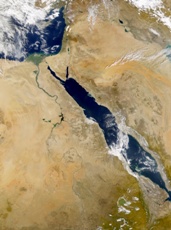Red Sea to save Dead Sea from drying up
 London, Dec 26 : Under a groundbreaking plan, the Dead Sea could be saved from drying up by flooding millions of gallons of seawater in from the Red Sea more than 110 miles away.
London, Dec 26 : Under a groundbreaking plan, the Dead Sea could be saved from drying up by flooding millions of gallons of seawater in from the Red Sea more than 110 miles away.
According to a report in the Telegraph, funding has been secured for a feasibility study into the ambitious and controversial scheme to reverse falling water levels.
The scheme involves a 110-mile long canal, dubbed `Red To Dead', that would channel roughly five million tonnes of seawater each day into the Dead Sea.
While schemes on a similar scale have been tried before for fresh water, this is by far the most ambitious seawater canalisation programme ever envisaged.
The new water is needed to avoid the complete disappearance of the Dead Sea, an event the World Bank warns would represent "an environmental calamity".
Overuse by farmers of water from the Jordan River, the only major influx into the Dead Sea, and climate change mean the level of the Dead Sea plunges by about three feet every year.
Its surface area has shrunk by a third to just 240 square miles in the last forty years and vast areas of foreshore have been exposed, pockmarked with dangerous sink holes.
Walking along the shoreline has become a hazardous business with visitors warned away by big red signs in case they fall into any of the thousand or so hollows in the ground.
Now, designers believe the steady daily flow of water offers a bonanza in hydroelectric power as the Dead Sea lies roughly 1,300 ft below the Red Sea.
The flowing water could drive turbines to generate power that could be used to run a desalination plant to create drinkable water, a much needed asset in Jordan, Israel and the occupied territories.
Tension between the three parties has meant progress in the scheme has been painfully slow but planners are now excited all three sides have agreed and the money for a feasibility study has been found.
The price tag for the whole project is currently assessed to be about 3 billion pounds. With water at such a premium for all three populations, it is believed funding will be possible.
"In fifty years time, the Dead Sea will disappear," said Adnan Zoubi, spokesman for the Jordanian water ministry, said.
"The canal project is the most important and feasible project to save the Dead Sea and will help solve Jordan's water problems," said Khaldoun Khushman, secretary general of the Jordanian water ministry. (ANI)